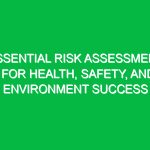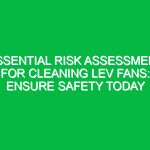Introduction
Hello team! Today, we’re here for a Toolbox Talk focused on an extremely important topic: Preventing Mechanical Issue-Related Crashes. As we all know, our Safety and the Safety of those around us is paramount. Mechanical failures can lead to serious accidents, and understanding how to prevent these issues is crucial for our daily operations. Let’s dive into the details of how we can minimize the risk of mechanical failures leading to crashes, and ensure we all go home safe at the end of the day.
Understanding Mechanical Issue-Related Crashes
Mechanical Issue-Related Crashes refer to accidents that occur due to failures in machinery or equipment. These failures can happen for various reasons including lack of Maintenance, operator error, or design flaws. Understanding the root causes of these crashes is vital for preventing them. For instance, consider a scenario where a hydraulic lift malfunctions due to a worn-out hose—this could lead to a severe injury or even fatality if not addressed promptly.
The Importance of Regular Maintenance
One of the most effective ways to prevent Mechanical Issue-Related Crashes is through regular maintenance of all equipment. Maintenance involves checking, repairing, and replacing parts of machinery to ensure it operates correctly and safely. A maintenance schedule should outline:
- Daily inspections of equipment before use.
- Weekly checks for wear and tear.
- Monthly comprehensive evaluations by qualified personnel.
By adhering to these schedules, we can catch potential issues before they escalate into significant problems. For example, a construction site that conducts regular inspections of its cranes has a much lower risk of mechanical failures compared to one that neglects maintenance.
Identifying Common Mechanical Failures
To effectively prevent Mechanical Issue-Related Crashes, we need to be aware of the common types of mechanical failures that can occur. Here are a few key examples:
- Brake Failure: This is one of the most critical failures that can occur in vehicles and machinery. Regular checks of brake systems are essential.
- Hydraulic Failures: Hydraulic systems can leak or malfunction, leading to a loss of control over machinery.
- Electrical Failures: Issues such as faulty wiring can cause machines to operate erratically, posing serious risks.
By recognizing these common failures, we can take proactive measures to address them. Always report any unusual sounds, vibrations, or performance issues to your supervisor immediately.
Safety Procedures to Follow
It’s essential to have clear safety procedures in place to prevent Mechanical Issue-Related Crashes. Here are some guidelines to follow:
1. Conduct Pre-Operation Checks
Before operating any machinery, always conduct a pre-operation check. This should include verifying that:
- The equipment is in good working condition.
- All safety guards and devices are in place.
- No leaks or unusual noises are present.
Taking a few minutes to perform these checks can save lives.
2. Proper Training and Certification
Only trained and certified personnel should operate complex machinery. If you’re unsure about how to operate a piece of equipment safely, please seek guidance from a supervisor or a fellow trained employee. This not only protects you but also your coworkers.
3. Use Personal Protective Equipment (PPE)
Wearing the appropriate PPE is critical when working with machinery. Always ensure you have the following:
- Hard hats to protect against falling objects.
- Steel-toed boots for foot protection.
- Gloves to protect your hands while handling equipment.
PPE is your last line of defense against injury, so never skip this step!
4. Develop an Emergency Response Plan
In case of a mechanical failure, having a well-defined emergency response plan can make all the difference. This plan should include:
- Immediate reporting procedures.
- First-aid measures and locations of first-aid kits.
- Evacuation routes and procedures.
Regular drills can help keep everyone prepared for unforeseen circumstances.
Real-Life Examples and Case Studies
Let’s take a moment to discuss some real-life scenarios that highlight the importance of preventing Mechanical Issue-Related Crashes.
Case Study: The Forklift Incident
In one instance, a warehouse employee was operating a forklift when the brakes failed. Due to a lack of maintenance, the brake system had not been inspected for months. The forklift collided with a stack of pallets, resulting in injuries to the operator and damage to the property. Had regular maintenance checks been conducted, this incident could have been avoided.
Hypothetical Scenario: Hydraulic Lift Failure
Imagine a construction site where a worker is using a hydraulic lift to reach a high area. If the hydraulic system malfunctions due to a leak, the lift could collapse, leading to serious injuries. Regular maintenance and pre-operation checks could identify such issues before they become dangerous.
Regulations and Standards
Understanding and complying with relevant Regulations is essential in preventing Mechanical Issue-Related Crashes. The Occupational Safety and Health Administration (OSHA) sets forth guidelines for Workplace Safety, including equipment standards and maintenance requirements. Compliance with these regulations not only keeps us safe but also protects the company from legal ramifications.
Importance of Compliance
By adhering to osha regulations and our company’s safety policies, we minimize risks and ensure a safer working Environment. This compliance is not just about meeting legal obligations; it is about protecting lives. Regular training sessions can help keep everyone informed about current regulations and Best Practices.
Actionable Advice and Best Practices
To wrap up our Toolbox Talk, let’s summarize some actionable advice and best practices for preventing Mechanical Issue-Related Crashes:
- Always conduct thorough pre-operation checks.
- Stay up-to-date with training and certifications.
- Adhere to maintenance schedules and report any issues immediately.
- Utilize appropriate PPE at all times.
- Participate in regular safety drills and training sessions.
By following these guidelines, we can significantly reduce the risk of accidents related to mechanical failures.
Conclusion
In conclusion, preventing Mechanical Issue-Related Crashes is a collective effort that requires everyone’s participation. By understanding the risks, adhering to safety procedures, and maintaining our equipment, we can create a safer workplace for all. Thank you for your attention and commitment to safety today. Remember, if you see something, say something—together, we can make a difference!


